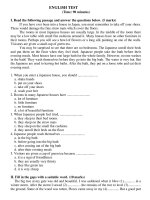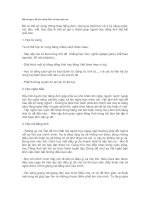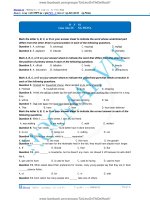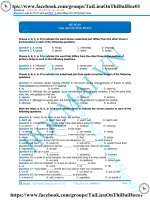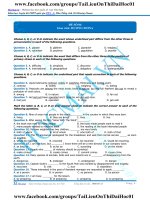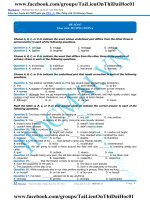- Trang chủ >>
- THPT Quốc Gia >>
- Ngoại Ngữ
Đề 01 tiếng anh cô hương fiona hocmai
Bạn đang xem bản rút gọn của tài liệu. Xem và tải ngay bản đầy đủ của tài liệu tại đây (420.22 KB, 16 trang )
Tải file word tại website:
ĐỀ SỐ 1
Chuyên đề
Dạng bài
Đơn vị kiến thức
Nhận
biết
Ngữ âm
Q3,4
Q1,2
Phát âm
Trọng âm
Sai về ngữ pháp
Tìm lỗi sai
Cấp độ nhận thức
Vận dụng cao
Thông
Vận
hiểu
dụng
thấp
Dạng và thì động từ
Sự hòa hợp chủ vị
Từ loại
Giới từ/Cụm động từ
Mạo từ
Đại từ
Định từ và lượng từ
Lặp từ/ Thông tin thừa
Cấu trúc mệnh đề/câu
Q5
Q6,7
Sai về nghĩa
Ngữ pháp
Hoàn thành
câu
Từ vựng
Thì động từ
Sự hòa hợp chủ vị
Mạo từ
Đại từ
Định từ và lượng từ
Liên từ
Giới từ/Cụm động từ
Cấu trúc mệnh đề/câu
Từ loại
Word choice
Collocation/ Idiom
Câu giao tiếp
Từ đồng
nghĩa
Từ trái nghĩa
Câu đồng
nghĩa
Nối câu
Điền từ
Đọc hiểu
Q8
Q9
Q11,18,19
Q10,12,13
Q14
Q15,17
Q16
Q20,21
Q22,23
Q24,25
Q26,27,28
Q29,30
Q31,32,33,34,35
Q36,37,38,39,40,41,42,
Q43,44,45,46,47,48,49,50
1
Tải file word tại website:
Mark the letter A, B, C, or D on your answer sheet to indicate the word that differs
from the other three in the position of primary stress in each of the following questions.
Question 1:
A. struggle
B. certain
C. action
D. police
Question 2:
A. considerate
B. continental
C. territorial
D. economic
Mark the letter A, B, C, or D on your answer sheet to indicate the word whose
underlined part differs from the other three in pronunciation in each of the following
questions.
Question 3:
A. easy
B. creature
C. create
D. increase
Question 4:
A. photographs
B. ploughs
C. gas
D. laughs
Mark the letter A, B, C, or D on your answer sheet to indicate the underlined part that
needs correction in each of the following questions.
Question 5: All the judges paid the dancer compliments on their excellent performance in the
A. All
B. paid
C. their
D. in
Question 6: Overpopulation is a short way to lead to poor, illiteracy and social evils.
A. Overpopulation
B. short way
C. poor
D. illiteracy
Question 7: To save energy, all the lights should be turned off before going out.
A. To save
B. should
C. turned off
D. going out
Mark the letter A, B, C, or D on your answer sheet to indicate the correct answer to each of
the following questions.
Question 8: My grandfather _______ for this company for over thirty years and then retire
D.
A. worked
B. works
C. is working
D. has worked
Question 9: More and more investors are pouring ______money into food and beverage start-ups.
A. an
B. the
C. a
D. Ø
Question 10: Paul has just sold his _______ car and intends to buy a new one.
A. black old Japanese
B. Japanese old black
C. old black Japanese
D. old Japanese black
Question 11: When asked about their preference for movies, many young people say that
they are in favor ________ science fiction.
A. for
B. of
C. in
D. with
Question 12: The larger the area of forest is destroyed, _________
A. the most frequent natural disasters are
B. the most frequently natural disasters occur
2
Tải file word tại website:
C. the more frequent are natural disasters
D. the more frequently natural disasters occur
Question 13: The rumors go that Jack will be arrested.He is said _______ a bloody robbery.
A. to have taken part in B. to have joined in
C. to join in
D. to take part in
Question 14: Each nation has many people who ______ take care of others.
A. volunteers
B. volunteer
C. voluntary
D. voluntarily
Question 15: Mr. Brown has kindly agreed to spare us some of his ______time to answer
our questions.
A. valuable
B. worthy
C. costly
D. beneficial
Question 16: It’s hard to __________on less than a million a month.
A. make a mess
B. make up your mind
C. make ends meet
D. make a fuss
Question 17: Mr. Dawson was given the award in _______ of his services to the hospital.
A. spite
B. charge
C. recognition
D. sight
Question 18: When the manager of our company retires, the deputy manager will ______that
position.
A. stand for
B. take over
C. catch on
D. hold on
Question 19: I think I should have _______ your mother while I was passing.
A. dropped in on
B. come up with
C. got on with
D. run into
Mark the letter A, B, C, or D on your answer sheet to indicate the most suitable
response to complete each of the following exchanges.
Question 20: Liz is telling Andrew about her first novel.
Liz. "Guess what? My first novel has just been published.
" Andrew. "____________"
A. It's my pleasure.
B. Congratulations!
C. Better luck next time!
D. It's very kind of you.
Question 21: Mrs. Smith and her students are visiting the zoo.
Mike. "Can I feed the gorilla, Mrs. Smith?"
Mrs. Smith. "______”.The sign says 'No feeding the animals'."
A. Of course you can
B. I don't think it works
C. I'm sure about that
D. I'm afraid not
Mark the letter A, B, C, or D on your answer sheet to indicate the word or phrase that is
CLOSEST in meaning to the underlined part in each of the following questions.
3
Tải file word tại website:
Question 22: The place has rapidly evolved from a small fishing community into a thriving
tourist resort.
A. developed
B. generated
C. created
D. increased
Question 23: I'm sure he will be home and dry in the interview because he has good
qualifications and wide experience.
A. be unsuccessful
B. be satisfied
C. be successful
D. be unsatisfied
Mark the letter A, B, C, or D on your answer sheet to indicate the word or phrase that is
OPPOSITE in meaning to the underlined part in each of the following questions.
Question 24: Don't tell Jane anything about the surprise party for Jack. She has got a big mouth.
A. can't eat a lot
B. hates parties
C. talks too much
D. can keep secrets
Question 25: He usually stays in peace in stressful situations but this time he really lost his
head.
A. kept calm
B. excited
C. lost his temper
D. lost touch
Mark the letter A, B, C, or D on your answer sheet to indicate the sentence that is closest in
meaning to each of the following questions.
Question 26: “It was your fault. You broke my windows,” said the woman to him.
A. The woman insisted him on breaking her windows.
B. The woman advised him to break her windows.
C. The woman told him to break her windows.
D. The woman blamed him for having broken her windows.
Question 27: After I had written my composition, I handed it to my teacher.
A. Writing the composition, I handed it to my teacher.
B. Having written my composition, I handed it to my teacher.
C. Handing the composition, I had written my composition
D. Handed the composition to my teacher, I wrote it.
Question 28: They were late for the meeting because of the heavy snow.
A. If it snowed heavily, they would be late for the meeting.
B. Had it not snowed heavily, they would have been late for the meeting.
C. But for the heavy snow, they wouldn't have been late for the meeting.
D. If it didn't snow heavily, they wouldn't be late for the meeting.
Mark the letter A, B, C, or D on your answer sheet to indicate the sentence that best
combines each pair of sentences in the following questions.
4
Tải file word tại website:
Question 29: The government have established some wildlife reserves. They want to protect
endangered species.
A. Whether the government have established some wildlife reserves or not, endangered
species are still protected.
B. Endangered species can't be protected although the government have established some
wildlife reserves.
C. The government have established some wildlife reserves so that endangered species can be
protected.
D. If the government established some wildlife reserves, they would be able to protect
endangered species.
Question 30: He was suspected of stealing credit cards. The police have investigated him for days.
A. He has been investigated for days, suspected to have stolen credit cards.
B. Suspecting to have stolen credit cards, he has been investigated for days.
C. Having suspected of stealing credit cards, he has been investigated for days.
D. Suspected of stealing credit cards, he has been investigated for days.
Read the following passage and mark the letter A, B, C, or D on your answer sheet to
indicate the correct word or phrase that best fits each of the numbered blanks from 31
to 35.
All relationships go through difficult times. In the past, when married couples had problems they
usually didn’t (31) _________. They had to either (32) _________ with each other or continue to
live together in an unhappy relationship. Getting divorced wasn’t an option for most people due
to economic and social reasons. Some people believe that this wasn’t such a bad thing. They say
that relationships require hard work and (33) _________. “If a relationship is going to last a
lifetime, you have to keep working at it,” says Doreen, who is celebrating her fiftieth wedding
anniversary this year. “It isn’t all roses and romance. No one perfect all of the time. These days
young people give up when there’s the (34) _________ argument.” Experts agree that
communication is key. The most important thing is to keep talking. How many times have you
heard yourself say to somebody, “If only you’d listen!” or “I wish you wouldn’t do that!” The
truth is, the (35) ______ couples talk, the better their relationship can be.
Question 31:
A. grow up
B. split up
C. chat up
D. make up
Question 32:
A. get on
B. go out
C. get back
D. fall out
Question 33:
A. agreement
B. argument
C. achievement
D. commitment
Question 34:
A. smallest
B. slightest
C. most violent
D. most controversial
5
Tải file word tại website:
Question 35:
A. more
B. fewer
C. less
D. least
Read the following passage and mark the letter A, B, C, or D on your answer sheet to
indicate the correct answer to each of the questions
Ambient divers are, unlike divers who go underwater in submersible vehicles of pressure
resistant suits, exposed to the pressure and temperature of the surrounding ambient water. Of
all types of diving, the oldest and simplest is free diving. Free divers may use no equipment
at all, but most use a face mask, foot fins, and a snorkel. Under the surface, free divers must
hold their breath. Most free divers can only descend 30 to 40 feet, but some skilled divers
can go as deep as 100 feet.
Scuba diving provides greater range than free diving. The word scuba stands for selfcontained underwater breathing apparatus. Scuba divers wear metal tanks with compressed
air or other breathing gases. When using open-circuit equipment, a scuba diver simply
breathes air form the tank through a hose and releases the exhaled air into the water. A
closed-circuit breathing device, also called a rebreather, filters out carbon dioxide and other
harmful gases and automatically adds oxygen. This enables the diver to breathe the same air
over and over. In surface-supplied diving, divers wear helmets and waterproof canvas suits.
Today, sophiticated plastic helmets have replaced the heavy copper helmets used in the
past.These divers get their air from a hose connected to compressors on a boat. Surfacesupplied divers can go deeper than any other type of ambient diver.
Question 36: Ambient divers are ones who_____
A. can descend to extreme depths
B. use submersible vehicles
C. use no equipment
D. are exposed to the surrounding water
Question 37: According to the passage, a free diver may use any of the following
EXCEPT______
A. a rebreather
B. a snorkel
C. foot fins
D. a mask
Question 38: According to the passage, the maximum depth for free divers is around ______
A. 40 feet
B. 100 feet
C. 200 feet
D. 1,000 feet
Question 39: When using closed-circuit devices, divers_______
A. exhale air into the water
B. hold their breath
C. breathe the same air over and over
D. receive air from the surface
Question 40: What does the word “descend” in the paragraph probably mean?
A. move to a lower level
B. climb to a higher place
C. swim on the river bed
D. go up and down slowly
6
Tải file word tại website:
Question 41: The word “This” in bold in paragraph 2 refers to_________.
A. filtering out carbon dioxide
B. adding oxygen
C. exhaling air into the water
D. filtering out harmful gases and adding oxygen.
Question 42: What are the helmets that surface-supplied divers use today made from,
according to the passage?
A. glass
B. copper
C. plastic
D. canvas
Read the following passage and mark the letter A, B, C, or D on your answer sheet to
indicate the correct answer to each of the questions from 43 to 50
There are a number of natural disasters that can strike across the globe. Two that are
frequently linked to one another are earthquakes and tsunamis. Both of them can cause a
great amount of devastation when they hit. However, tsunamis are the direct result of
earthquakes and cannot happen without them.
The Earth has three main parts. They are the crust, the mantle, and the core. The crust is the
outer layer of the Earth. It is not a single piece of land. Instead, it is comprised of a number of
plates. There are a few enormous plates and many smaller ones. These plates essentially rest
upon the mantle, which is fluid. As a result, the plates are in constant
– yet slow – motion. The plates may move away from or toward other plates. In some cases,
they collide violently with the plates adjoining them. The movement of the plates causes
tension in the rock. Over a long time, this tension may build up. When it is released, an
earthquake happens.Tens of thousands of earthquakes happen every year. The vast majority
are so small that only scientific instruments can perceive them. Others are powerful enough
that people can feel them, yet they cause little harm or damage. More powerful earthquakes,
however, can cause buildings, bridges, and other structures to collapse. They may
additionally injure and skill thousands of people and might even cause the land to change it
appearance.
Since most of the Earth’s surface is water, numerous earthquakes happen beneath the planet’s
oceans. Underwater earthquakes cause the seafloor to move. This results in the displacement
of water in the ocean. When this occurs, a tsunami may form. This is a wave that forms on
the surface and moves in all directions from the place where the earthquake happened. A
tsunami moves extremely quickly and can travel thousnads of kilometres. As it approaches
land, the water near the coast gets sucked out to sea. This causes the tsunamis to increase in
7
Tải file word tại website:
height. Minutes later, the tsunami arrives. A large tsunami – one more than ten meters in
height – can travel far inland. As it does that, it can flood the land, destroy human
settlements, and kill large numbers of people
Question 43: Which of the following statements does paragraph 1 support?
A. A tsunami happens in tandem with an earthquake.
B. The most severe type of natural disaster is an earthquake.
C. Earthquakes cause more destruction than tsunamis.
D. Earthquakes frequently take place after tsunamis do.
Question 44: The word “it” in the first paragraph refers to_____
A. The core
B. The crust
C. The Earth
D. The mantle
Question 45: What is the passage mainly about?
A. When earthquakes are the most likely to happen.
B. What kind of damage natural disasters can cause.
C. How earthquakes and tsunamis occur.
D. Why tsunamis are deadlier than earthquakes.
Question 46: The word “adjoining” in bold in paragraph 2 is closest in meaning to________.
A. residing
B. approaching
C. bordering
D. appearing
Question 47: The word “perceive” in bold in paragraph 3 is closest in meaning to________.
A. detect
B. prevent
C. comprehend
D. locate
Question 48: Which of the following is true regarding the crust?
A. It is the smallest of the Earth’s three layers
B. It is thicker on land than it is under the water.
C. There many separate pieces that make it up
D. The mantle beneath it keeps it from moving too
Question 49: Based on the passage, what is probably true about tsunamis?
A. They kill more people each year than earthquakes.
B. They are able to move as fast as the speed of sound.
C. They cannot damage ships sailing on the ocean.
D. They can be deadly to people standing near shore.
Question 50: Which of the following is NOT mentioned in paragraph 3 about earthquakes?
A. How severe the majority of them are
B. What kind of damage they can cause
C. How often powerful ones take place
D. How many people they typically kill
8
Tải file word tại website:
Đáp án
1.D
11.B
21.D
31.B
41.D
2.A
12.D
22.A
32.A
42.C
3.C
13.A
23.C
33.D
43.A
4.B
14.D
24.D
34.B
44.B
5.C
15.A
25.A
35.A
45.C
6.C
16.C
26.D
36.C
46.C
7.D
17.C
27.B
37.A
47.A
8.A
18.B
28.C
38.B
48.C
9.D
19.A
29.C
39.C
49.D
10.C
20.B
30.D
40.A
50.C
LỜI GIẢI CHI TIẾT
Câu 1: Đáp án D
struggle
certain
action
police
ˈstrʌgl
ˈsɜːtn
ˈækʃ(ə)n
pəˈliːs
Câu 2: Đáp án A
considerate
continental
territorial
economic
kənˈsɪdərɪt
ˌkɒntɪˈnɛntl
ˌtɛrɪˈtɔːrɪəl
ˌiːkəˈnɒmɪk
Câu 3: Đáp án C
easy/ˈizi/
creature/ˈkriʧər/
createkri/ˈeɪt/
increase/ˈɪnˌkris/
Câu 4: Đáp án B
photographs
ploughs
gas
laughs
ˈfoʊtəˌgræfs
plaʊz
gæs
læfs
Câu 5: Đáp án C
Their => her/his
Câu 6: Đáp án C
Poor => poverty
Câu 7: Đáp án D
Before + Ving chỉ khi 2 mệnh đề cùng chủ ngữ, chủ ngữ của mệnh đề chính là “all the lights”
9
Tải file word tại website:
Câu 8: Đáp án A
“Then retired” được dùng ở thì quá khứ
-> hành động “work for this company” xảy ra trong quá khứ
Câu 9: Đáp án D
“money” không đếm được
Câu 10: Đáp án C
OSACOMP = Opinion, Size,Shape, Age, Color, Origin and Material.
Old = Age
Black = Color,
Origin = Japanese
Câu 11: Đáp án B
to be in favour of something/somebody: ủng hộ ai hoặc cái gì, trong trường hợp này có thể
được hiểu với nghĩa
Câu 12: Đáp án D
So sánh hơn + mệnh đề: Càng...thì càng... Đáp án C tuy đúng cấu trúc nhưng nghĩa không
hợp lí, Thiên tai xảy ra thường xuyên chứ không “là thường xuyên”
Câu 13: Đáp án A
Câu 14: Đáp án D
Câu 15: Đáp án A
valuable: quý giá
worthy: đáng (nỗ lực cố gắng)
costly: đắt đỏ, chỉ giá cả
benificial: lợi ích, có lợi
Câu 16: Đáp án C
Make ends meet: kiếm (đủ) sống.
Make up your mind: đưa ra quyết định
Make a mess of sth: làm hỏng cái gì
10
Tải file word tại website:
Make a fussn of sb: đối xử tốt với ai đó
“less than a million a month” : ít hơn 1 triệu 1 tháng -> ý nói về tài chính
Câu 17: Đáp án C
In charge of: chịu trách nhiệm cho việc gì
Câu 18: Đáp án B
Take over = chiếm lấy, gánh vác (một vị trí, trách nhiệm..)
Hold on = nắm lấy, giữ lấy
Stand for = không chấp nhận điều gì (hành vi, trạng thái)
Cacth on = trở thành phong trào, nổi tiếng
Câu 19: Đáp án A
Come up with = nảy ra (ý tưởng,…)
Drop in = ghé qua (không có báo trước)
Get on with = bắt đầu hoặc tiếp tục làm việc
Run into = tình cờ gặp mặt
Câu 20: Đáp án B
A. Đó là niềm vui của tôi.
B. Xin chúc mừng!
C. Chúc may mắn lần tới!
D. Nó rất tốt.
Câu 21: Đáp án D
A. Tất nhiên bạn có thể
B. Tôi không nghĩ rằng nó hoạt động
C. Tôi chắc chắn về điều đó
D. Tôi không sợ
Câu 22: Đáp án A
Developed: phát triển
Generated: tạo ra
Created: sáng tạo
Increased: tăng cao
Câu 23: Đáp án C
Unsuccessful: không thành công
11
Tải file word tại website:
Satisfied: hài lòng
Successful: thành công
Unsatisfied: không hài lòng
Câu 24: Đáp án D
Big mouth: nhiều chuyện, không thể giữ bios mật bất cứ chuyện gì
Câu 25: Đáp án A
Lost sb’s head = lost sb’s temper = tức giận
Keep calm: bình tĩnh
Lost touch: mất liên lạc
Câu 26: Đáp án D
"Đó là lỗi của anh. Anh đã phá vỡ cửa sổ của tôi, "người phụ nữ nói với anh ta.
A. Người phụ nữ khăng khăng đòi anh phá cửa sổ.
B. Người phụ nữ khuyên anh ta phá cửa sổ của cô.
C. Người phụ nữ nói với anh ta để phá vỡ cửa sổ của cô.
D. Người phụ nữ đổ lỗi cho anh vì đã phá vỡ cửa sổ của cô.
Câu 27: Đáp án B
Sau khi tôi viết bài viết của mình, tôi đưa nó cho giáo viên của mình.
A, C, D sai thì của câu
Câu 28: Đáp án C
Họ đã đến trễ cho cuộc họp vì tuyết rơi nhiều.
A. Nếu tuyết rơi nhiều, họ sẽ đến trễ cho cuộc họp.
B. Nếu nó không bị tuyết rơi, họ sẽ bị trễ cuộc họp.
C. Nếu không vì tuyết rơi nhiều, họ sẽ không bị trễ cuộc họp.
D. Nếu tuyết không rơi nhiều, họ sẽ không đến trễ cho cuộc họp.
Câu 29: Đáp án C
Câu 30: Đáp án D
Câu 31: Đáp án B
Grow up: lớn lên
Split up: cắt bỏ mối quan hệ, tuyệt giao
Chat up: tán tỉnh
12
Tải file word tại website:
Make up: trang điểm
Câu 32: Đáp án A
Get on: tiếp tục phải làm việc gì
Go out: ra ngoài
Get back: quay lại
Fall out: cãi nhau
Câu 33: Đáp án D
Agreement: sự đồng ý
Argument: sự tranh cãi
Achievement: sự đạt được
Commitment: cam kết
Câu 34: Đáp án B
Smallest: nhỏ nhất
Slightest: nhẹ nhất
Most violent: bạo lực nhất
Most controversial: gây tranh cãi nhiều nhất
Câu 35: Đáp án A
Câu so sánh “càng… càng…”
Câu 36: Đáp án C
Thợ lặn trong bờ là những người:
A. có thể xuống đến độ sâu cực đoan
B. sử dụng xe chìm
C. không sử dụng thiết bị
D. được tiếp xúc với nước xung quanh
Câu 37: Đáp án A
Thợ lặn tự do có thể sử dụng bất kì cái gì trừ cái nào sau đây
A. một bình oxi
B. một ống thở
C. vây chân
D. mặt nạ
Câu 38: Đáp án B
Câu 39: Đáp án C
13
Tải file word tại website:
Khi sử dụng thiết bị lặn, thợ lặn:
A. thở ra không khí trong nước
B. nín thở
C. hít thở nhiều lần
D. nhận không khí từ bề mặt
Câu 40: Đáp án A
Từ " descend" trong đoạn văn có thể có nghĩa là gì?
A. chuyển sang chỗ thấp hơn
B. leo lên một nơi cao hơn
C. bơi trên lòng sông
D. đi lên và xuống chậm
Câu 41: Đáp án D
Từ "This" in đậm trong đoạn 2 đề cập đến:
A. lọc ra carbon dioxide
B. thêm oxy
C. thở ra không khí vào trong nước
D. lọc ra khí độc hại và thêm oxy.
Câu 42: Đáp án C
Mũ bảo hiểm mà các thợ lặn cung cấp bề mặt sử dụng ngày nay được sản xuất là gì, theo
đoạn văn?
Một ly
B. đồng
C. nhựa
D. canvas
Câu 43: Đáp án A
Câu nào sau đây được nói đến ở đoạn 1?
A. Một cơn sóng thần xảy ra song song với một trận động đất.
B. Loại thiên tai nghiêm trọng nhất là một trận động đất.
C. Động đất gây ra nhiều sự hủy diệt hơn sóng thần.
D. Động đất thường xuyên xảy ra sau khi sóng thần làm.
Câu 44: Đáp án B
Từ "it" trong đoạn đầu tiên đề cập đến:
A. Lõi
14
Tải file word tại website:
B. Lớp vỏ
C. Trái đất
D. Lớp phủ
Câu 45: Đáp án C
Ý chính của bài là gì?
A. Khi động đất có nhiều khả năng xảy ra nhất.
B. Loại thiên tai gây hại nào có thể gây ra.
C. Làm thế nào động đất và sóng thần xảy ra.
D. Tại sao sóng thần đáng sợ hơn động đất.
Câu 46: Đáp án C
Từ “adjoining” được in đậm ở đoạn 2 gần nghĩa với:
A. cư trú
B. tiếp cận
C. giáp
D. xuất hiện
Câu 47: Đáp án A
Từ “perceive” được in đậm trong đoạn 3 gần nghĩa với:
A. phát hiện
B. ngăn chặn
C. thấu hiểu
D. xác định vị trí
Câu 48: Đáp án C
Điều nào sau đây là đúng về lớp vỏ?
A. Đây là lớp nhỏ nhất trong ba lớp của Trái Đất
B. Nó dày hơn trên đất hơn là dưới nước.
C. Có nhiều phần riêng biệt tạo nên
D. Lớp phủ bên dưới nó ngăn nó không di chuyển
Câu 49: Đáp án D
Điều gì có lẽ đúng về sóng thần?
A. Chúng giết nhiều người hơn mỗi năm so với động đất.
B. Chúng có thể di chuyển nhanh như tốc độ của âm thanh.
C. Chúng không thể làm hỏng tàu thuyền trên đại dương.
D. Chúng có thể gây tử vong cho những người đứng gần bờ.
15
Tải file word tại website:
Câu 50: Đáp án C
Điều nào sau đây KHÔNG được đề cập trong đoạn 3 về động đất?
A. Mức độ nghiêm trọng của của chúng như thế nào
B. Chúng có thể gây ra thiệt hại gì
C. Làm thế nào để một trận động đất mạnh diễn ra
D. Có bao nhiêu người thiệt mạng trong thiên tai
16
